As you stand amidst a sea of flickering candles, enveloped in a hushed atmosphere of reverence, you ponder the essence of worship. What compels individuals to bow their heads, sing hymns, or light incense in devotion? The layers of meaning woven into this ancient practice are as intricate as a tapestry, offering insight into the human spirit and our quest for connection to the divine. Join this exploration of the profound depths of worship and uncover the myriad ways it shapes our lives and communities.
Key Takeaways
- Reverent homage and adoration to a deity.
- Involves rituals, ceremonies, and symbolic gestures.
- Gateway to spiritual connection and personal growth.
- Fosters unity, community engagement, and shared beliefs.
- Diverse global traditions reflecting human search for transcendence.
Definition of Worship
Fundamentally, worship can be defined as the reverent homage and adoration given to a deity or sacred entity. This act of worship is deeply intertwined with cultural influences and religious practices.
Cultural influences play a significant role in shaping the way worship is conducted, from the music and rituals used to the attire worn during ceremonies. Religious practices, on the other hand, dictate the specific ways in which worship is carried out, including the prayers recited, the symbols utilized, and the overall structure of the worship service.
The fusion of cultural influences and religious practices in worship creates a unique tapestry of beliefs and traditions that vary greatly across different societies and faiths. Each culture brings its own set of customs and values to the act of worship, enriching the experience and fostering a sense of unity among believers.
Historical Origins
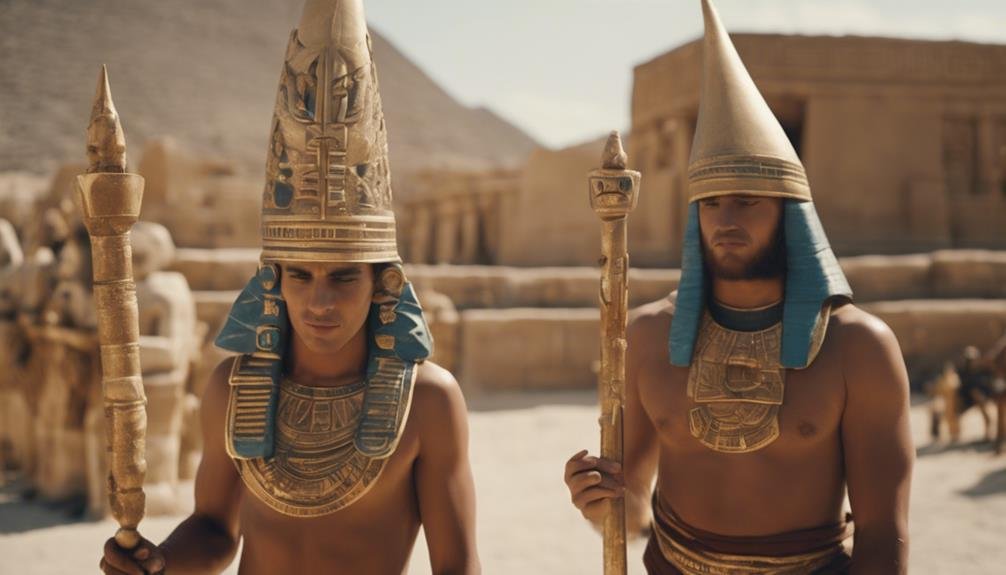
The historical origins of worship can be traced back to ancient civilizations and religious practices that date back centuries. The concept of worship has evolved over time, influenced by cultural, social, and spiritual factors.
In antiquity, worship often involved rituals, sacrifices, and ceremonies aimed at honoring deities or higher powers. These practices varied widely across different regions and belief systems, showcasing the diverse origins of worship.
From the ancient civilizations of Mesopotamia and Egypt to the classical cultures of Greece and Rome, worship played a central role in shaping societal norms and spiritual beliefs. The evolution of worship can be seen through the shifts from polytheistic to monotheistic religions, the development of sacred texts, and the establishment of formalized religious institutions.
As societies progressed and interacted with one another, the exchange of ideas and practices influenced the way worship was conducted. The historical origins of worship reveal a rich tapestry of traditions, beliefs, and rituals that continue to shape contemporary religious practices.
Types of Worship
As you explore the concept of worship, it's paramount to ponder the various forms it takes and the significance of worship within communities.
Understanding the different types of worship practices can provide valuable insights into the diverse ways in which individuals and groups express their devotion and reverence.
Forms of Worship
Different cultures around the world express their reverence and devotion through various forms of worship. Worship practices encompass a wide array of rituals, ceremonies, and traditions that serve as conduits for establishing a spiritual connection.
From elaborate ceremonies in grand temples to intimate gatherings in nature, the forms of worship are as diverse as the individuals who partake in them.
One prevalent form of worship is prayer, a practice found in almost every religious tradition. Through prayer, individuals communicate their hopes, fears, and gratitude to a higher power, seeking solace and guidance.
Another common form of worship is meditation, a practice that fosters introspection and mindfulness, leading to a deeper spiritual connection.
Rituals, such as chanting, singing hymns, or performing symbolic gestures, are also integral to many worship practices. These actions not only express devotion but also create a sense of unity and shared purpose among worshippers.
Worship in Communities
Exploring the diverse manifestations of communal worship reveals a tapestry of spiritual practices that bind individuals together in collective reverence. In community engagement, worship takes on various forms, reflecting the group dynamics and values of the participants. These gatherings often encompass rituals, music, prayer, and shared experiences that foster a sense of unity among worshippers.
One prevalent type of communal worship is congregational gatherings, where individuals come together to express their faith through joint ceremonies and celebrations. These events not only strengthen the spiritual connection among attendees but also promote a sense of belonging and support within the community. Additionally, community engagement in worship extends beyond physical gatherings to include virtual platforms, where individuals from diverse backgrounds can unite in shared spiritual practices.
Understanding the significance of group dynamics in worship is essential for fostering a sense of collective identity and spiritual growth. By actively participating in communal worship, individuals contribute to the rich tapestry of shared experiences that shape and strengthen the bonds within the community.
Symbols and Rituals
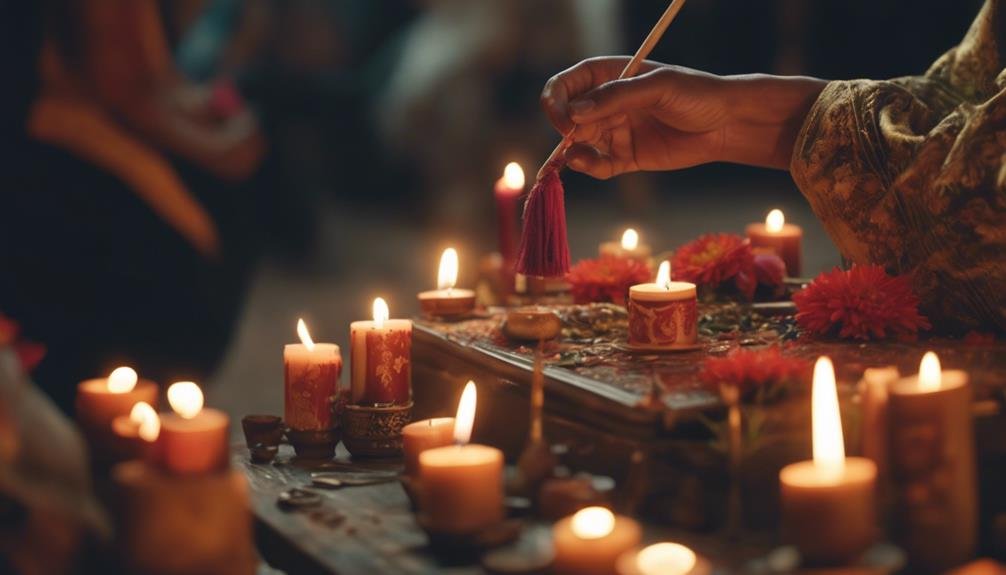
As you ponder the essence of worship, consider the profound impact of symbolic gestures and rituals in religious practices.
These gestures hold deep significance, often embodying centuries of tradition and spiritual meaning.
Exploring the role of symbols and rituals can offer insight into the complex tapestry of worship traditions across cultures and beliefs.
Symbolic Gestures in Worship
Symbolic gestures in worship serve as powerful conduits for believers to express reverence and devotion through physical actions and rituals. These gestures, laden with meaning and significance, transcend verbal language, allowing individuals to communicate with the divine on a profound level.
Whether it's the lighting of candles, bowing, or kneeling, each act holds symbolic weight, evoking spiritual expression that goes beyond mere words.
Through these symbolic gestures, worshippers engage in a form of embodied spirituality, connecting the physical self with the metaphysical sphere. The repetition of these actions in rituals serves to reinforce beliefs, creating a sense of continuity and tradition within religious practices.
These gestures can also act as reminders of core tenets and values, grounding individuals in their faith and guiding their moral compass.
In the domain of worship, symbolic gestures play an essential role in fostering a deep sense of connection and devotion, offering believers a tangible way to express their spirituality and engage with the divine presence that transcends the limits of language and rational thought.
Significance of Rituals
Within religious practices, the rituals embedded with symbols hold profound significance in guiding believers towards a deeper understanding of their spirituality and connection to the divine. Rituals aren't mere routines but are intricate actions laden with cultural and traditional values that serve as a bridge between the earthly world and the spiritual core.
These practices aren't stagnant; they evolve over time, adapting to shifts in societal norms and individual beliefs while retaining their fundamental essence.
Traditions woven into rituals provide a sense of continuity with the past, anchoring individuals in a shared history that stretches across generations. The repetition of these rituals reinforces their importance, embedding them deep within the collective consciousness of a community.
Through these cultural practices, individuals find a sense of belonging and identity, fostering a unity that transcends individual differences. Rituals offer a framework within which believers can express their devotion and reverence, creating a sacred space where the divine presence is palpable.
Essentially, rituals aren't just actions; they're transformative experiences that shape the spiritual journey of the faithful.
Spiritual Significance
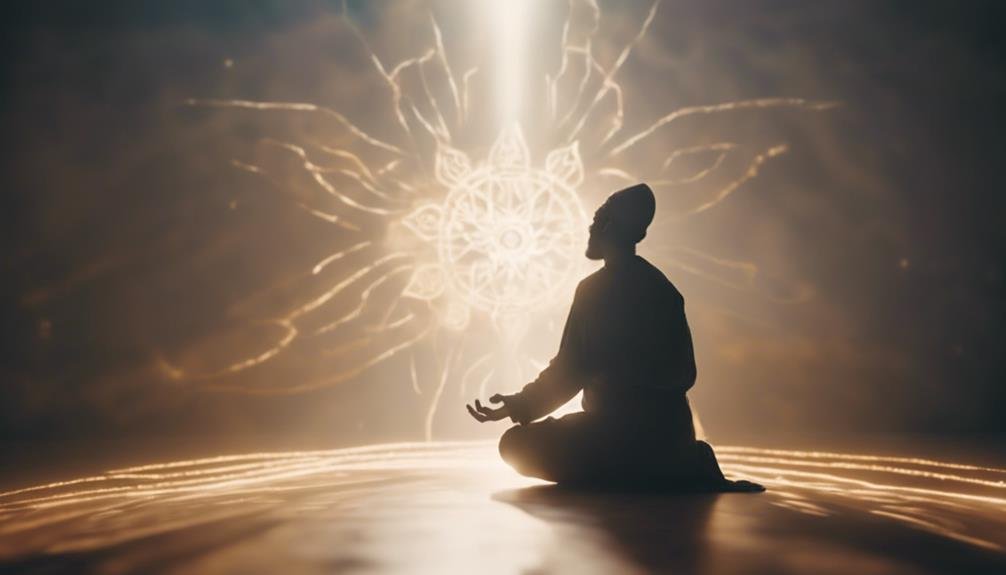
Exploring the spiritual significance of worship reveals the profound connections between individuals and their beliefs. Worship transcends mere cultural practices; it serves as a gateway to a deeper spiritual connection. Through worship, individuals can explore the depths of their faith, forging intimate ties with their spiritual beliefs. This connection isn't bound by societal norms or traditions but rather by the individual's genuine devotion and reverence.
The spiritual significance of worship is a personal journey that allows individuals to delve into their innermost beliefs and connect with something greater than themselves. It provides a space for introspection, contemplation, and ultimately, spiritual growth. By engaging in acts of worship, individuals can strengthen their bond with their spirituality, finding solace and meaning in their beliefs.
In essence, the spiritual significance of worship lies in the profound connection it fosters between individuals and their spiritual beliefs. It transcends cultural practices and societal expectations, offering a sacred space for individuals to explore and deepen their faith.
Personal Connection

Delving into the essence of worship reveals the intricate web of personal connection individuals cultivate with their spiritual beliefs. Worship, at its core, is a profound act of personal reflection and spiritual growth. It's a journey that leads you to explore the depths of your inner connection with the divine presence you hold dear.
Through worship, you engage in a process of introspection, an in-depth exploration of your beliefs, values, and emotions. This personal reflection allows for a deeper understanding of oneself and the spiritual path one treads. It's in these moments of stillness and contemplation that spiritual growth takes root, nurturing your connection with the divine.
As you engage in worship, whether through prayer, meditation, or rituals, you open yourself up to the divine presence that surrounds you. This inner connection serves as a guiding light, illuminating your path and offering solace in times of need.
Worship, hence, becomes a sacred space where personal transformation and spiritual communion intertwine, enriching your journey towards enlightenment.
Community Practices
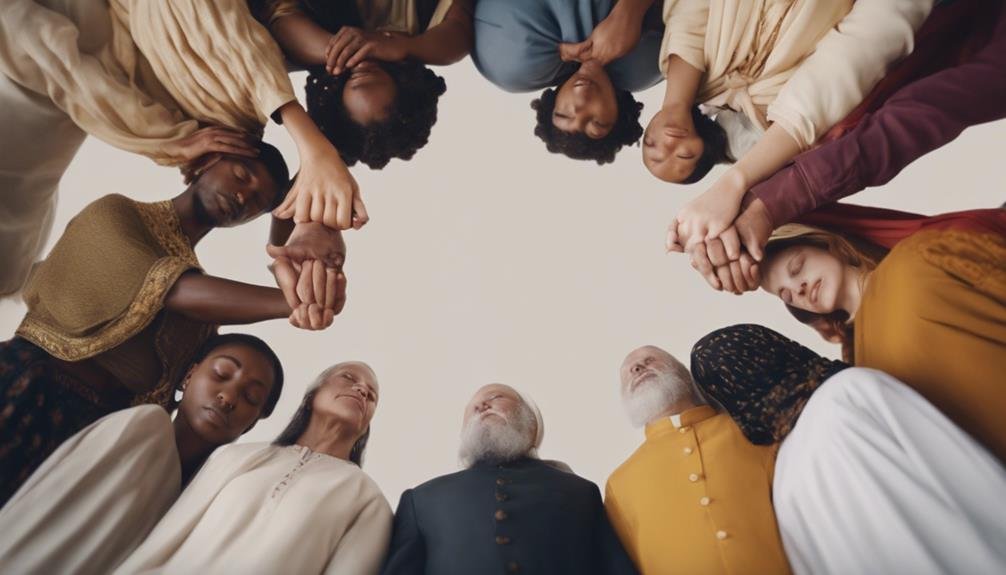
Engaging in worship within a community setting fosters a shared experience of spiritual connection and collective reverence. Community engagement in worship brings individuals together in a shared pursuit of transcendence, creating a space where the boundaries between the self and the collective blur, allowing for a deeper sense of unity.
Group dynamics play an essential role in shaping the worship experience, influencing the energy, focus, and emotional resonance within the communal gathering. Through shared rituals, prayers, and songs, a sense of solidarity is cultivated, reinforcing the spiritual bond that ties the community together.
Within the context of community practices, the dynamics of belonging, participation, and mutual support come into play, enriching the worship experience with a sense of belongingness and interconnectedness. The collective engagement in worship acts as a catalyst for personal growth and spiritual development, offering a platform for individuals to explore their beliefs, express their emotions, and find solace in the shared journey towards the divine.
Modern Interpretations
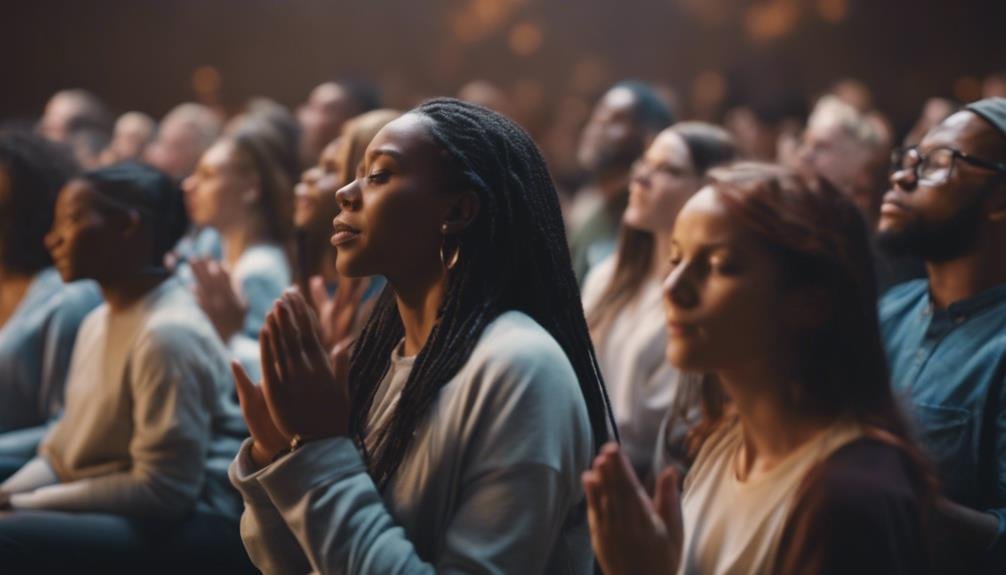
Considering contemporary perspectives and evolving societal values, modern interpretations of worship reflect a dynamic interplay between tradition and innovation in spiritual practices. In the domain of worship, cultural influences have played a significant role in shaping how individuals engage with their spiritual beliefs.
Here are five intriguing aspects that highlight the complexity of modern interpretations:
- Personalization: Individuals are increasingly customizing their worship experiences to align with their unique spiritual journeys.
- Inclusivity: Modern interpretations emphasize inclusivity, welcoming diverse beliefs and practices into the domain of worship.
- Technology Integration: The use of technology in worship, such as live streaming services or virtual prayer groups, has become more prevalent.
- Environmental Consciousness: Many modern interpretations of worship emphasize environmental stewardship and the interconnectedness of all living beings.
- Artistic Expression: Worship now often involves artistic expressions like music, dance, and visual arts to convey spiritual messages in innovative ways.
Global Perspectives

Global perspectives on worship showcase a diverse tapestry of cultural traditions and spiritual practices that reflect the interconnected nature of humanity's search for transcendence. Across the globe, worship takes on various forms influenced by cultural differences and religious practices. These differences highlight the richness of human expression and the profound ways in which individuals connect with the divine.
In exploring global perspectives on worship, one is confronted with a mosaic of rituals, ceremonies, and beliefs that encapsulate centuries of tradition and spiritual evolution. From the rhythmic dances of African tribes to the serene meditation practices of Eastern philosophies, each cultural nuance adds to the global understanding of worship as a universal human experience.
Frequently Asked Questions
How Does Worship Impact Mental Health and Well-Being?
Engaging in worship can have a profound impact on your mental health and well-being. The mind-body connection is strengthened through spiritual fulfillment, leading to emotional healing and a sense of inner peace.
Additionally, worship often provides a supportive community environment where you can find understanding and encouragement. These factors combined can contribute to a healthier mindset and an improved overall sense of well-being.
Can Worship Practices Vary Within the Same Religion?
Worship traditions within the same religion can indeed vary greatly due to cultural influences. These variations can manifest in diverse forms of rituals, prayers, music, and other practices.
Embracing these differences enriches the spiritual experience, fostering a sense of unity in diversity. By acknowledging and respecting the various ways worship is expressed, individuals can find freedom in connecting with their faith on a personal and communal level, enhancing their religious journey.
Is There a Difference Between Private and Public Worship?
In worship, the distinction between private and public holds significance. Private worship allows personal reflection and introspection, fostering a deep connection with the divine.
Conversely, public worship emphasizes community engagement, uniting believers in shared rituals and expressions of faith. Both forms offer unique opportunities for spiritual growth and connection, catering to individual needs and communal bonds within religious practices.
Understanding these differences enriches one's worship experience and relationship with the divine.
What Role Does Music Play in Worship Rituals?
Music's significance in worship rituals is profound. It acts as a conduit, transcending words to evoke emotions, stirring the soul.
The melodies and rhythms create a spiritual connection, enhancing the worship experience. Through music, one can express devotion, gratitude, and reverence in ways that words alone cannot.
It serves as a universal language, uniting individuals in collective worship and celebration. Embrace the power of music in your worship rituals to deepen your spiritual journey.
How Can One Maintain a Balance Between Worship and Daily Life?
Maintaining a balance between worship and daily life requires intentional effort. By prioritizing spiritual discipline and utilizing effective time management, you can achieve a harmonious work-life balance.
Dedicate specific moments for daily devotion to nurture your spiritual well-being. Embrace the freedom to integrate worship seamlessly into your routine, allowing it to enrich your daily experiences.
Aim for a holistic approach that honors both your spiritual and worldly responsibilities.
Conclusion
To sum up, worship is like a river flowing through the depths of human spirituality, nourishing the soul with its sacred waters. It's a timeless practice that transcends boundaries, connecting individuals with the divine through rituals, symbols, and communal gatherings.
The act of worship is a profound expression of reverence and adoration, fostering personal growth, spiritual unity, and a sense of belonging to something greater than oneself. Embrace the transformative power of worship and let it guide you on your spiritual journey.


